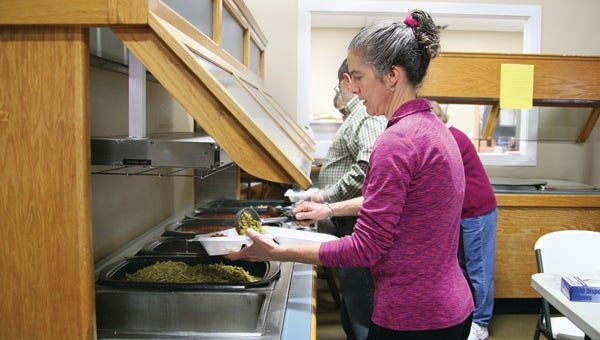Local churches take aim at hunger
Published 9:02 am Wednesday, April 22, 2015

Star Photo/Abby Morris-Frye
Volunteer Michelle McLellan places a scoop of green beans into a boxed dinner.
Each Saturday morning, volunteers from six local churches take their turns dishing up meals for as many as 250 to 275 persons, who show up at the TLC Center as early as 7:30 a.m. to stand in line for a carry-out.
Sue Smith, a volunteer from Memorial Presbyterian Church, who has been with Food for the Multitude from its beginning in 1985, has seen the program grow and become self-sustainable. “It’s been amazing,” she said.
While the goal is obviously filling empty stomachs, volunteers and organizers say the meals represent what the community is all about: Coming together to meet the needs of other.
“It’s not political. It’s not religious. It’s just doing the Christian thing and being obedient to the Word of God,” Smith said.
The program was the brainchild of Benny Buck and John Froggett, members of St. Thomas Episcopal Church. “That’s where the program had its beginning — in the kitchen and dining area of St. Thomas. Initially, the people who came for meals ate in. That was one of the requirements,” Smith said.
At that time, the program also received food from Second Harvest Food Bank, and an accounting had to be made for each person, who received a meal. “We still keep a record of each person who comes and how many meals they carry out,” Smith said.
The ministry was created by a coalition of six churches: Memorial Presbyterian, First Presbyterian, St. Elizabeth Catholic, Southside Christian, First United Methodist, and St. Thomas. During its 30-year ministry, Food for the Multitude has served over 500,000 meals.
In 2012, the program outgrew the space at St. Thomas. “We literally ran out of room,” said Smith. The program ended in March of that year, but was reprised back in the summer of 2013 when the Abortion Alternative and Women’s Center extended an invitation for the churches to re-start the program at their place at Don Lewis Road.
“We moved our appliances from St. Thomas to the TLC, and it has worked out nicely,” said Smith.
“I don’t think most people realize the need in this community. There are many people who have very meager resources. They are not able to afford their basic needs. Yes, there are people who take advantage of it as with any program. But, for the most part the people we serve are needy,” said Smith.
The cooperating churches have two yard sales each year. From these funds they buy most of the vegetables and fruits and carry-out containers. “We do not receive any government funds or outside donations. We do not receive food from Second Harvest. The program is self-sustaining. The participating churches do help from time to time with the meat and desserts,” Smith said.
She explained that each church usually has a set menu. At Memorial Presbyterian, it is chicken casserole, green beans, a fruit, and usually a cookie.
“We watch the grocery ads and whatever is on sale that is usually what we buy. Chicken dishes are a staple and much cheaper than beef,” Smith shared.
Smith, who helps make the casserole said it is usually prepared on Friday evening.
Susan Hathaway, who heads up the Food for the Multitude Program at First United Methodist Church, said their menus consist of ham, green beans, whole potatoes, tropical fruit salad, cookies, and bread.
“We do the meal on site Saturday morning. The ham is already sliced and cooked, so we just warm it up and prepare the beans and potatoes,” she said.
Hathaway said when she arrives before 8 a.m. on Saturday, there are people outside waiting to get their meal. “They help me carry my stuff in and usually I fix coffee and serve it. During the time we are preparing the food, they are often sharing with our volunteers about other needs they may have,” Hathaway said
Both, Hathaway and Smith said before they begin distributing the meals, they always form a circle and have prayer.
Each church participating in the program usually has 8 to 10 members who volunteer regularly. “It’s a lot of food to prepare and demands time and energy, but it is so rewarding. I only wish more churches would get involved,” said Smith.
Hathaway said one of the more rewarding aspects of the ministry is the close, personal relationship she has formed with many of the people who receive the meals. “They are really special,” she said.
In addition to the food served by First United Methodist, one of their volunteers usually plays the piano for the guests.
“The great thing about this program is that there are churches of different beliefs involved, but it has never been an issue. We are united in one purpose and that is to serve God and to help those in our community who have a need. That’s what it’s all about,” said Smith.
Smith estimates that it costs between $175 to $200 each week to provide the meals. “It’s not a lot of money when you talk about feeding 250 people, but it’s giving of self,” she said.
Hathaway agrees. “It’s a small price. But, it’s really an investment in the lives of people who have more needs than just an empty stomach. And, if the church can’t reach out to them, who can?”




